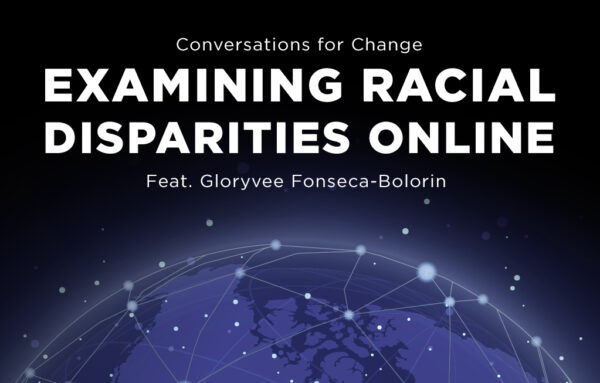In a world already gripped by digital connectivity, the COVID-19 pandemic’s stay-at-home orders, school and office closures, and ban on social gatherings somehow elevated the prominence of screens in our lives even more. Remote work, online education, and Zoom happy hours, became the only way to remain connected to colleges, classmates, friends, and family. Innately a brightside to technology, the new need to be so continuously connected in times of such uncertainty, also provided a platform for voicing increasing societal tensions and even racially charged conversations.
Despite the fact that we are sitting at home and being called to come together in support of each other amid a global public health crisis, online we seem to be pulling ourselves further and further apart. Facebook posts seem to frequently try to place blame or pass the buck and Twitter fuels feuds among followers and strangers alike.
In this interview Gloryvee Fonseca-Bolorin, U-M doctoral candidate at the Center for the Study of Higher and Postsecondary Education, discusses race, social integrity, and cultural movements through the lens of social media. Including the pivotal cultural role of Black Twitter, how a pandemic has further blurred the already gray lines between professional and personal presences, and how online tools are enabling a new age of activism that aims to heighten social awareness, justice issues, and the impact of COVID-19 on Black communities.
Gloryvee’s dissertation focuses on the social-psychological experiences of underrepresented and marginalized students at predominantly White institutions and her professional background includes human development, student support programs, and social science research related to diversity, equity and inclusion in higher education. Her prior work experiences include the U-M National Center for Institutional Diversity, Center for the Study of Black Youth in Context, and Rackham Graduate School.
Interview conducted by Tatyana Fykes, Presidential Initiatives Content Specialist, #UMSocial
Q: During the coronavirus pandemic, there seems to have been an influx in racially charged conversations online as people seek answers and accountability. What should individuals focus on to keep their integrity and mentality positive?
“When I’m thinking about racialized comments, I’m seeing it from a perspective of how do we transform that to make sure that we really have a society that can create a very inclusive environment,” Fonseca-Bolorin says. “And that’s a very hard thing to do.”
Q: Black twitter serves as a cultural resonance among like-minded individuals within the Black community. What are your thoughts on it’s influence and the potential success of social movements during this time?
“Being able to connect with other people who see similar things to what I see and have experienced some of the things I’ve experienced, and who want to do something about it—I think that’s really powerful because we didn’t have that before and it was a lot easier to feel isolated,” she says.
She adds that she views Black Twitter as a source of strength and inspiration, and explains that it revitalizes her to engage and share information with others.
Q: How do you think the COVID-19 pandemic has impacted the Black community and what have you seen that brings you hope?
“I want to believe that none of us will be the same. That we’re all going to be slightly different because of this, but hopefully better, hopefully stronger, more adaptable— and I think at the end of the day this is what I study: resiliency,” she says. “Resiliency is all about being able to overcome things and come out of it even stronger.”



